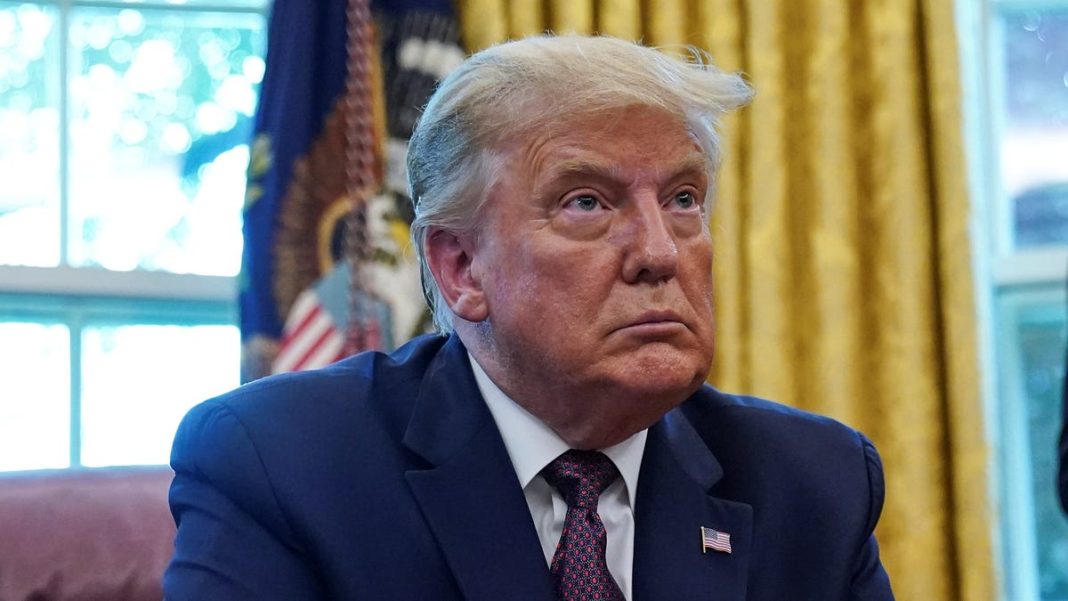Trump declares he will immediately demand lower rates, claims superior knowledge over the Fed
Former President Donald Trump has quickly resumed a stance he took during his first presidency, pressuring Federal Reserve Chair Jerome Powell and other officials to reduce interest rates.
Economists warned that Trump’s statements made during a video call at the World Economic Forum in Switzerland could jeopardize the Fed’s autonomy and might backfire, igniting inflation fears that could result in increased long-term rates.
During his remarks, Trump suggested that a drop in oil prices should prompt him to insist on immediate interest rate cuts. He pointed out the need for Saudi Arabia and OPEC to take action on oil prices, stating, “With oil prices going down, I’ll demand that interest rates drop immediately.”
Although Trump did not explicitly pressure the Fed to lower rates right away, he speculated that falling oil prices might contribute to reduced inflation, leading him to advocate for lower rates, according to Jonathan Millar, an economist at Barclays and former principal economist at the Fed from 2004 to 2018.
Furthermore, during last year’s presidential election, the Wall Street Journal and several other outlets reported that Trump’s advisors were considering a plan to undermine the Fed’s traditional independence. This plan would potentially allow the president to influence interest rate decisions.
Trump’s recent comments also reflect the pressure he exerted on the Fed during his first term.
Can the president influence the Fed?
Historically, the Federal Reserve has been viewed as insulated from political pressure so it can base its interest rate decisions on economic needs. The Fed typically lowers rates to stimulate a slumping economy and job market, and raises them to combat inflation or prevent significant price increases.
In contrast, a U.S. president may pursue interest rate reductions to enhance economic performance, thereby improving re-election prospects for themselves or other lawmakers affiliated with their party.
When reporters asked Trump about his statements later on, he asserted, “I believe I have a greater understanding of interest rates than they do.”
He continued, “I certainly understand them better than the person primarily responsible for those decisions,” referring to Powell. “I take their guidance seriously, but if I disagree, I will express it.”
When asked whether the Fed would heed his call for lower interest rates, Trump confirmed, “yeah.” He further noted he would consider meeting with Powell about rate reductions “at the right time.”
What prompted the Fed to lower interest rates?
After aggressively raising rates to curb inflation spurred by the pandemic, the Fed reduced rates by one percentage point in the latter half of last year, following a significant easing in annual price increases. However, the Fed projected two quarter-point cuts in 2025 after unexpectedly high inflation readings and a stable labor market reduced the urgency for further cuts.
Market expectations indicate the Fed may lower its key interest rate by a quarter point in both June and December, while Barclays only anticipates one rate cut in June.
Previously, the Fed had indicated four potential rate cuts this year. Their next meeting is scheduled for Tuesday and Wednesday.
Fed officials have suggested that their predictions for fewer cuts may be influenced by Trump’s intentions to impose substantial tariffs on imports from Canada, Mexico, and China, as well as his plans to deport millions of undocumented immigrants. High tariffs could lead to increased costs for consumers, while deportations might result in labor shortages that drive wages and prices higher, according to economists.
Millar expressed doubt that Trump’s comments on interest rates would alter Fed policy decisions. However, he acknowledged that such remarks raise significant concerns about the Fed’s independence.
If the Fed chooses to lower rates sooner than anticipated, it might lead investors to question whether Trump influenced that decision. Conversely, if rates remain unchanged, it could suggest that policymakers delayed their decision to assert their independence rather than for economic justification.
“The perception is important,” Millar noted.
“It poses a clear challenge to central bank independence,” remarked Francesco Bianchi, an economics professor at Johns Hopkins University who examines the impact of political agendas and monetary policy on asset values.
Ironically, if investors fear that the Fed’s decisions could be swayed by Trump’s desire to cut rates, this could instigate inflation concerns that raise long-term rates, such as mortgage rates, Bianchi and Millar indicated.
Powell has consistently asserted that the Fed operates independently of political influences. His tenure as chair will last until May 2026, and he has stated that the law prevents Trump from removing or demoting him.
Contributing: Swapna Venugopal Ramaswamy, YSL News

